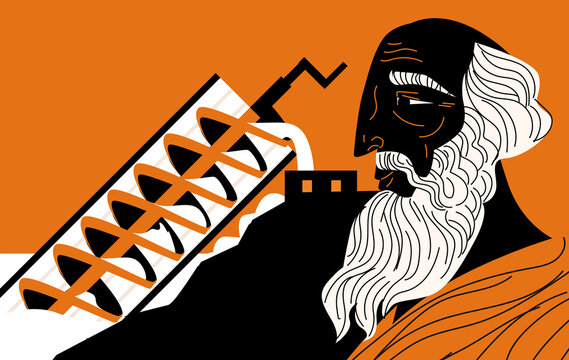Archimedes of Syracuse, the ancient Greek mathematician, physicist, engineer, and inventor, stands as one of the most celebrated figures in the history of science. Born in 287 BCE, Archimedes made groundbreaking contributions to a diverse range of fields, from mathematics and hydrostatics to astronomy and engineering. His remarkable discoveries and inventions not only transformed the scientific landscape of his time but also continue to influence modern scientific thought. In this article, we delve into the scientific discoveries of Archimedes that have left an indelible mark on human knowledge.
Principle of Buoyancy: Archimedes’ Eureka Moment
One of Archimedes‘ most famous contributions lies in the field of hydrostatics, particularly his discovery of the principle of buoyancy. The story of Archimedes’ “Eureka” moment unfolds as he pondered over a problem assigned to him by King Hiero II. Archimedes realized that when an object is immersed in a fluid, it experiences an upward force equal to the weight of the fluid it displaces. This realization, now known as Archimedes’ principle, provided a quantitative understanding of buoyancy and laid the foundation for future advancements in hydrodynamics and naval architecture.
Archimedes’ Screw: Revolutionizing Water Transport
Another ingenious invention credited to Archimedes is the Archimedes’ screw. Developed around 250 BCE, this device employed a spiral mechanism to raise water from lower levels to higher levels. By harnessing the power of rotation, Archimedes’ screw enabled efficient irrigation and drainage systems, greatly influencing agriculture and land development. The concept of the Archimedes’ screw remains relevant even today and finds application in various industries, including wastewater treatment and power generation.

Calculating Pi: The Circumference-Diameter Ratio
Archimedes made significant advancements in mathematics, and one of his notable achievements was the accurate calculation of pi (π). By approximating the value of pi using polygons inscribed and circumscribed around a circle, he managed to obtain remarkably precise values for this fundamental mathematical constant. Archimedes’ rigorous mathematical approach and his ability to refine the estimation of pi allowed him to contribute to the field of geometry and lay the groundwork for future developments in calculus.
Law of the Lever: Mechanical Advantage
Archimedes’ exploration of mechanics resulted in the formulation of the law of the lever. He postulated that the balance of a lever depends on the product of the weight and the distance from the fulcrum. This fundamental principle laid the groundwork for understanding the concept of mechanical advantage, essential for the development of various mechanical devices. The law of the lever is still employed today in engineering and plays a pivotal role in designing machinery, vehicles, and structures.
Archimedean Solids: Insights into Geometry
Archimedes contributed significantly to the field of geometry, particularly through his studies on polyhedra known as Archimedean solids. These are convex polyhedra with identical vertices and faces that are not regular polygons. By examining the relationships between their vertices, edges, and faces, Archimedes expanded the understanding of geometric shapes beyond regular polyhedra. His work on Archimedean solids inspired subsequent investigations into polyhedral geometry and laid the foundation for advancements in crystallography.
Archimedes’ scientific discoveries and inventions propelled the boundaries of knowledge in numerous fields, leaving an indelible legacy that still resonates today. From his groundbreaking principle of buoyancy and the invention of the Archimedes’ screw to his accurate calculation of pi and formulation of the law of the lever, Archimedes demonstrated his extraordinary intellectual prowess. His contributions not only advanced scientific thought during his time but also laid the foundation for future developments in physics, mathematics, and engineering. Archimedes’ profound insights and innovative mindset serve as a testament to the timeless nature of scientific discovery and the enduring impact of human curiosity.
How useful was this post?
Click on a star to rate it!
Average rating / 5. Vote count:
No votes so far! Be the first to rate this post.
Author
-
Meet Dr. Kendall Gregory, a highly accomplished professional with a remarkable academic background and a deep passion for empowering individuals through knowledge. Dr. Gregory’s educational journey began with a Bachelor of Science degree, followed by a Doctor of Chiropractic Medicine, focusing on diagnosing and treating musculoskeletal conditions. He further expanded his expertise with a Master's degree in Oriental Medicine, specializing in acupuncture and Chinese herbology, and a Master's degree in Health Care Administration, emphasizing his dedication to improving healthcare systems. Dr. Gregory combines his extensive knowledge and practical experience to provide comprehensive and integrative healthcare solutions. Through his writings, he aims to inspire individuals to take charge of their health and make informed decisions.
View all posts







